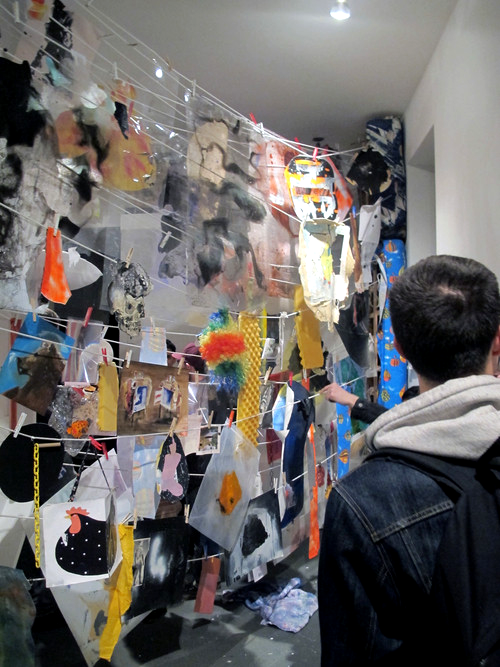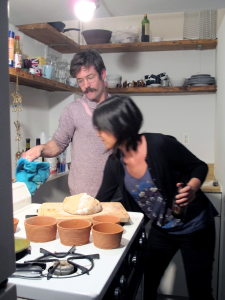
How frequently do you allow others into your private spaces? How often do you invade the private spaces of others? We know, or at least we assume, that we think our most private thoughts and do our most intimate (even perverse) things in those spaces. What happens when the boundary is blurred?
“Perverted Living,” the second exhibition for recently opened FLAT Space, questions this boundary between public and private. Featuring works by School of the Art Institute MFA students Stevie Hanley and Jacob Raeder, the show approaches perversion from multiple directions, in ways that satisfy all the senses.
Curator and project manager at FLAT George William Price has committed himself to an experiment based on, and occurring in, his own living space. Hidden away a few blocks north of Cermak and a stone’s throw from the Dan Ryan, the apartment keeps its distance from the main artery of Pilsen’s gallery network. The space, a garden apartment with white walls and high ceilings, does not—indeed, it probably could not—hide the fact that it is a home. Wrought iron stairs lead to a loft area with a mattress; shelves of glassware and cooking miscellany populate the small kitchen area underneath the loft.
“An apartment gallery is nothing new,” says Price, “but it’s what you do with it.” FLAT Space’s “Perverted Living” does not simply exist as art in a space made for art. The show draws attention to the living space itself; the art becomes furniture and décor, and vice versa.
The opening night of “Perverted Living” is very much an apartment party. Beer sits in a tub of ice in the backyard, where smokers are smoking and a small handmade radio plays sound and static from its perch on a ladder. Everyone seems to know everyone else; most visitors are SAIC students or affiliates.
Inside, artist Jacob Raeder is baking bread. On a counter next to the fridge is a small PB&J-making station and another handmade radio, this one made of bread; a third radio is displayed near the space’s entrance. A final radio, also made of bread, is in the bathroom.
These four radios are Raeder’s work. Of the bathroom radio in particular he says, “There’s actually a scene in the movie Gummo, [which] I found to be disturbing in an unexpected way, of eating spaghetti in a bathtub. He’s taking a bath and his mom brings him spaghetti. That stuck out as exceptionally gross and exceptionally disturbing…the idea of food in the bathroom.” This bread radio is “more of a prototype,” but its presence is as disconcerting as it could be.
Near the entrance of the apartment is Raeder’s other contribution to “Perverted Living:” two chairs around a coffee table stacked with paint-splattered Playboys, the chairs facing a small television on the opposite wall. Onscreen is a close-up of a penis slowly and deliberately penetrating a turning cylinder of clay.
Described by Raeder as an “overtly sensual rather than overtly sexual” experience, the looping video is hypnotizing in a wholly non-erotic way. It satisfies not only voyeuristic curiosities but aesthetic ones; it is plainly pleasing to look at.
This video, along with his radios, demonstrates Raeder’s interest in using art to appeal to multiple senses. “Same as the bread being baked that you’re smelling; sound, distorted, coming out of the radios; the video piece is kind of a tacit acknowledgement or nod to an ocular experience of the world,” he explains.
Up in the loft, guests are crouching and sitting cross-legged, chatting next to a stripped mattress. The contents of a large Jell-O mold are strewn across the bed, and dozens of Jell-O shots in paper cups surround the mess. Those sitting closest to the bed are more than happy to grab a handful of shots and pass them to those on the farther end of the loft space.
This “Jell-O Banquet” is the work of Stevie Hanley, who is especially focused on the animal byproducts that are used to make Jell-O. “It’s these happy chroma colors that sort of stand for…normative Americana, wholesome families. But at the same time it represents the last stages of industrial slaughter.” The scattered Jell-O mess screams gluttony, a whimsical jab at consumer culture. The piece, intended only for display during the opening night of “Perverted Living,” is presented on Price’s own bed.

In the apartment’s main area Hanley’s other, larger piece stretches diagonally between two bedframes, one mounted on a window and the other on a support beam. Clotheslines run between the frames, and the lines are hung with paintings, fabric, scraps of mattress foam, a clown wig, and other objects. Hanley cites his interest in anthropologist Mary Douglas as part of the motivation behind his work: “She says that dirt is nothing more than matter out of place. That has been a huge working impetus for me.” This piece, in part because of its nature as a collage, is perhaps the least cohesive in the show; its size and structure make it dizzying and nearly impossible to fully absorb, and its contents hang static, uninterested in engaging with one another.
A sense of pervasion, rather than one of overt perversion, threads the works of “Perverted Living” together. Hanley’s bedframe collage looms large and disorienting; over the din of chatter one can sometimes hear the crackle of one of Raeder’s radios; above all floats the scent of fresh-baked bread. The context and the crowd define the space as a gallery, and it is difficult to imagine the apartment empty, quiet, in daylight. This versatility and complexity is crucial, though, to both the space and the show. Without perversions there are hardly changes; without changes we are static.
FLAT Space, 2023 S. Ruble St. Through June 1. Saturday-Sunday, 1-4; by appointment. (312)647-6286. flatspacechicago.com


